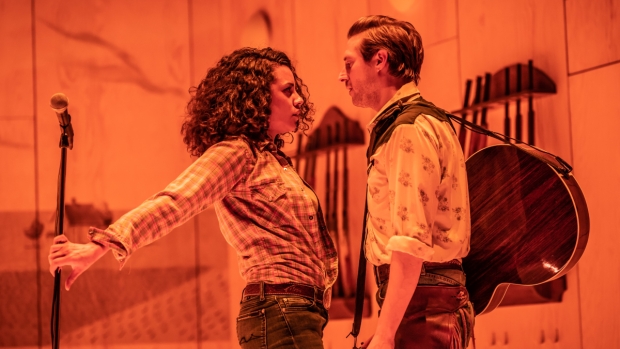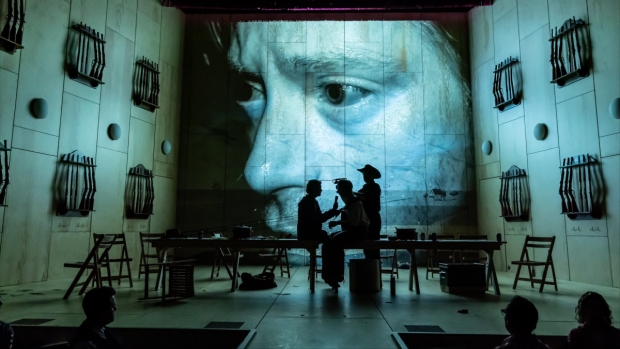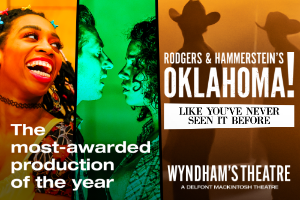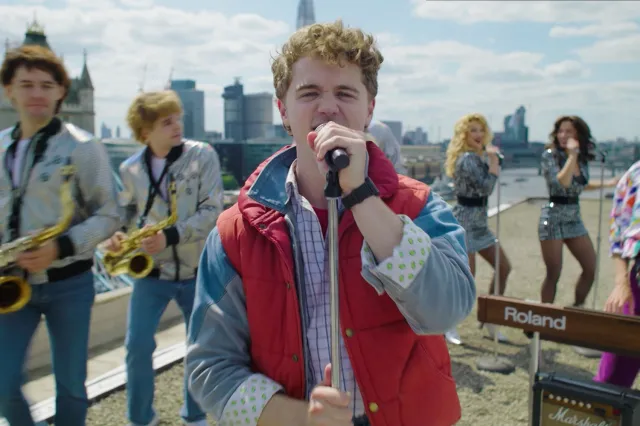”Oklahoma!” in the West End review – love it or hate it, you certainly won’t forget it

© Marc Brenner
This sunny tale of a cowboy and farmhand competing to take a girl to the local box social in a time when the titular Sooner State was on the verge of joining the Union, acquires an air of simmering misogyny and unease when repositioned into a gun-happy, present-day, rural America where rifle cabinets line the village hall walls and aggression seems to be everybody’s default position. The score is given a Country ‘n’ Western/Bluegrass makeover that only occasionally makes one long for the orchestral swell of yore (the band is terrific) and the singing is sometimes a little ragged as befits the gritty, non-glamorous setting. It’s a raucous but sour take on the material that has moments of immutable brilliance but also several sections where the sheer impenetrability of what Fish and his collaborators are trying to achieve results in a theatrical stalemate where neither the piece as written nor the inventive chutzpah of the creative team wins out.
One example of this is the famous Dream Ballet where heroine Laurey addresses the romantic entanglements in her life; this is now transformed into a solo dance, shrouded in dry ice and half in pitch darkness with live-filmed images piercing the gloom. It’s menacing, athletic, nightmarish… and Rodgers’s music is distorted into a sort of deafening Progressive Rock. Marie-Astrid Mence, diminutive and dynamic, delivers John Heginbotham’s splayed-fingered, angular-limbed choreography, pitched somewhere between horseplay and eroticism, with admirable commitment. At one point, an assortment of cowboy boots drop from the flies, presumably to signify male upon female oppression (the constant references to women “belonging to” men in the script really rankle in a modern setting, which is of course the point), but the whole section may prove too esoteric for many.
The so-called ‘hero’, Curly, on the other hand, in Arthur Darvill’s commendably brave reading, is a dead-eyed, manipulative chancer capable of turning on the charm for sure, but with a streak of ruthlessness that chills the blood. There’s a strong hint of homoeroticism in the cruel act one scene, usually played for at least some laughs but here in almost total darkness with the actors’ faces in night vision projected onto the back wall, where Curly visits Jud in his living shack and tries to persuade him to commit suicide.

© Marc Brenner
Anoushka Lucas’s Laurey is a fascinating combination of resignation, fury and fear, a far from uncomplicated heroine, and the music, albeit transposed down, sits exquisitely in her voice. Georgina Onuorah’s wonderful, show-stealing Ado Annie is gorgeous: superbly sung, very funny and ambiguous as to whether she’s in thrall to the sexual possibilities all around her or to her own undeniable allure. James Davis and Stavros Demetraki are delightfully vivid as the men under her spell. Liza Sadovy’s flinty, amoral Aunt Eller is worlds away from the benign elder figure in conventional productions, and proves vinegary, imposing and highly effective in this setting.
At times aggressively ugly and only intermittently uplifting, this is inevitably not going to be everybody’s idea of what they want from this particular musical. What Fish’s staging, and Lael Jellinek and Grace Laubacher’s starkly striking set, loses from its original immersive iteration, it gains in focus for being in a conventional proscenium arch auditorium. The cover-up surrounding Jud’s murder at the end is grimly pragmatic, and probably the only moment where the production actively subverts the original text. It leads into a final, blood-spattered blast of the (usually) celebratory title song (“we know we belong to the land / and the land we belong to is grand”) where the increasingly traumatised and desperate body language and facial expressions of the characters suggests that their lives will never be the same again.
Fish has succeeded in making Oklahoma! seem even more tragic than Carousel, which is something of an achievement, and lays bare the seething cauldron of injustice and despair beneath the wholesome American Dream. The show is referred to as Rodgers and Hammerstein’s Oklahoma! in all billing for this production, possibly lest anybody confronted with the blood-soaked final sequence thinks they’re at Ivo van Hove’s Oklahoma!, and what is notable is that, for all the unconventionality of this version, the exquisite craftsmanship of Richard Rodgers and Oscar Hammerstein II’s original creation shines through. Watching it, I vacillated between thoughts of The Emperor’s New Clothes, and being pinned to the back of my seat by the audacity and sheer ingenuity. Love this show or hate it, you certainly won’t forget it.

















